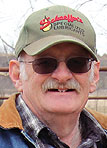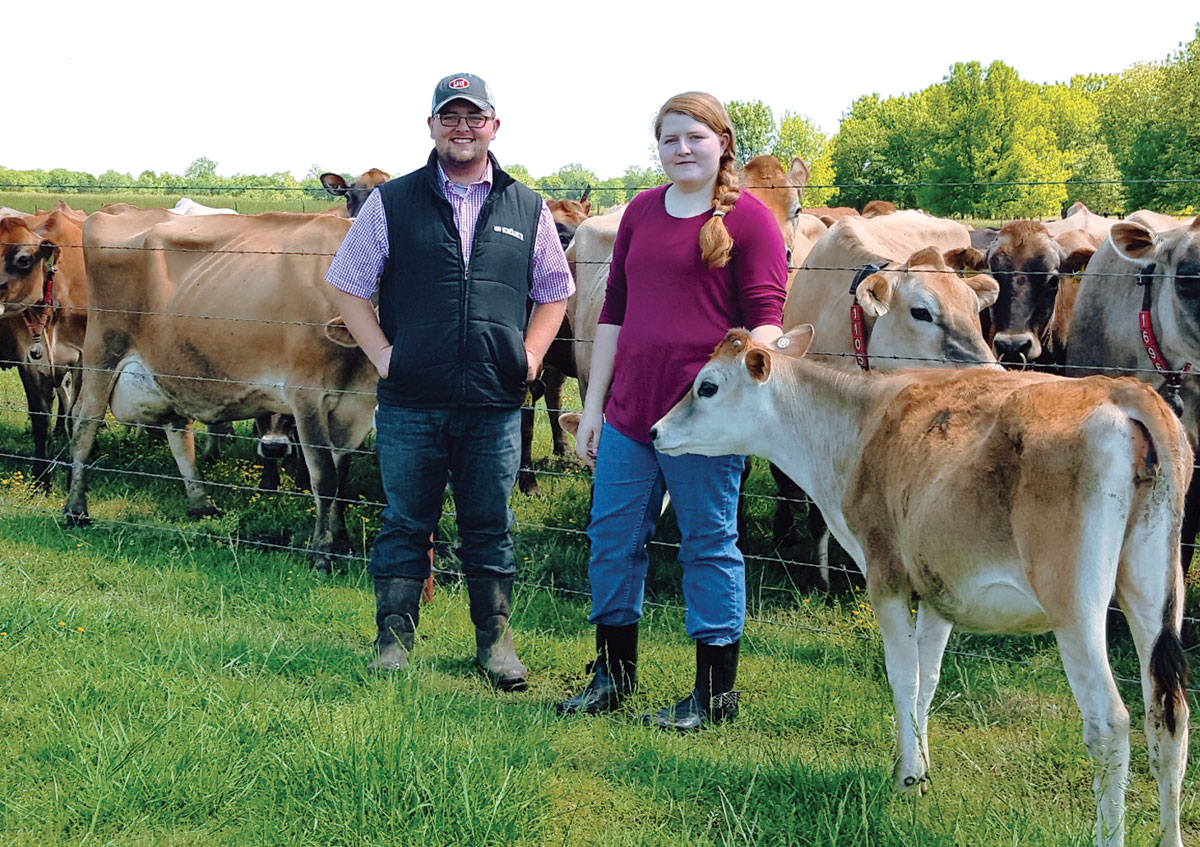
The Ozark highlands in Stilwell, Okla., is home to Jerry and Shirley Garrison. Both moved to Stilwell in 1965 to begin their married life in an 8-foot trailer, that grew to a 12-foot trailer and eventually into a home they built. “Some people who start a farm, want it all today. You have to have patience. We did not live the luxury life. Everything we made, we put right back into farming,” said Jerry. He started out on a dairy farm, working for his dad, and then off to college he went to study Animal Husbandry. “For anyone working with farm animals, you need both the hands-on workmanship and the education.” Jerry took his education very serious.
A lot of care goes into breeding, feeding and keeping the herd healthy. “The best way to care for the herd is to make sure you have lots of acreage and grass, keep good minerals out like Nutrina, do not overstock and have good water.”
The Black Angus and Holstein cross are considered good momma cows to Jerry ever since he started raising them before he quit the dairy business. They originally were half of each but now the cross is one-fourth Holstein and one-eighth Black Angus. They prefer calving in the fall but still do a few in the spring. “When fall breeding the cow it can simmer, eat grass and minerals that will give her plenty of weight to reproduce. In the spring you have to feed them enough to calve which could be challenging,” said Jerry.
They keep mineral tubs out all year round. The mineral does not blow away and the salt blocks have to be put out separately.
Antibiotics have to be used in serious cases such as with sore foot. The cow cannot be slaughtered until it is out of its system, which is usually 30 days. “Fescue can cause it but if you graze close, it can shorten it. Also, the cows can get sick from fescue because if it gets too wet while it is growing, it will harbor fungus,” warned Jerry.
When it comes to calves, Jerry recommended that six weeks before they are weaned they go on feed long enough to get used to feeding on their own.
They have lost cows in the past, mainly to pneumonia but have not lost very many. “If you have them, you can lose them. Summer is the worst. Dry hot weather can cause respiratory conditions. Other farmers have problems with respiratory issues pretty often. They get vaccinated against pneumonia at 250 pounds then again a month before weaning, which is not quite at 500 pounds. You have to take care of them and it’s important to document it all,” urged Jerry.
“Cows can be picky eaters just by how you feed them. If you pile their hay high in a ditch, they will eat it. If you just roll it out, they won’t touch it. If they get sick, the calves wont go to the feed trough. Some signs of illness are they have droopy ears or runny nose. The calves show it in their eyes. Their eyes are runny and look weak, plus they are slow to blink. Kind of like a kid but their eyes drop,” said Jerry. Vaccinations are intended to prevent all respiratory infections and diseases to avoid giving antibiotics.
Feeding cattle properly by keeping plenty of hay, minerals, and 14 percent protein will enable winter survival. “Water is very important around here. You can do without a lot of things but you cannot do without water,” said Jerry. The cattle drink fresh spring and well water. They do have ponds but prefer spring since it is fresher, cleaner and they do better.
They also need their winter coat. “South Dakota lost a lot of cattle because the weather came as a surprise and they did not have time to grow their winter coat (long hair). In show cattle, you can fool mother nature. They go into cool rooms if you want the hair thick and fluffy,” said Jerry.
“Our niece recently took her cow through this process of encouraging hair growth to show her cow at the Tulsa State Fair,” said Shirley. They took interest in her and like supporting her with meeting her goals because it is familiar territory for them. Both like to be available to go to her shows.
Jessica chose a pure bred Simmental to reproduce in the future. This was Jessica’s first time showing at the Tulsa State Fair. As far as future goals, “I want to attend nursing school to become a registered nurse. Meanwhile, I will continue breeding Simmental purebreds and the proceeds of the sales will supplement my finances during school,” said Jessica. She placed First Place in Class and Reserve Champion in Division at the Tulsa State Fair. “My aunt and uncle took time out of their lives to come and support me at every show. They provided me with equipment to use at the stock shows and also helped me pay for some of the entry fees. I cannot thank them enough for their continuous love and support. God has truly blessed me with loving family members,” said Jessica.
Jerry and Shirley not only provide generous help, they also receive it. Their son, Jerry Ed Garrison, is their right hand man. “He keeps track of everything on the farm and is a tremendous help,” said Jerry. Jerry then looked at his wife, both gleaming at each other, and said, “I could not do any of this without her.”







